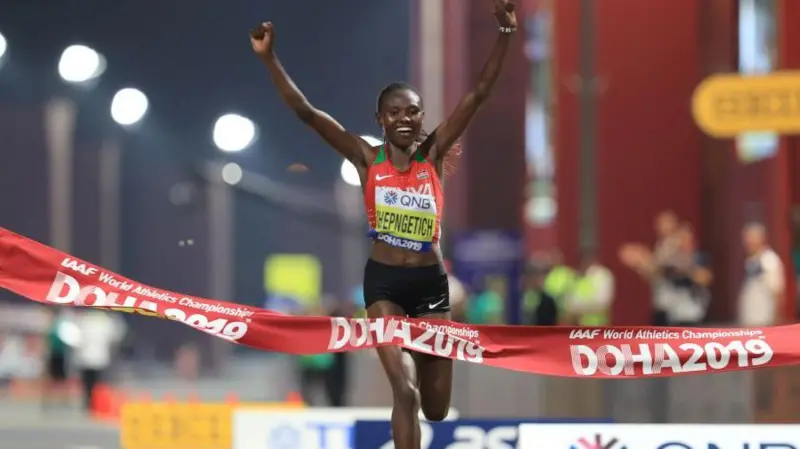Ruth Chepngetich’s stunning performance at the Chicago Marathon on Sunday has rewritten the record books, raising new questions about the limits of human endurance in the marathon. The Kenyan runner clocked an astonishing two hours, nine minutes, and 57 seconds, shattering the previous world record held by Ethiopian Tigst Assefa by nearly two minutes.
While the headline time is remarkable, the details surrounding her performance are equally impressive. Chepngetich reached the halfway mark in 1:04:16, a time that would have ranked as the fifth-fastest women’s half-marathon ever recorded. For the second half, she finished in 1:05:41, which would have placed her 36th on the all-time list for half-marathons. This incredible consistency shows her extraordinary stamina and speed over the entire 26.2 miles.
To put her marathon in perspective, Chepngetich’s average pace was 15 minutes and 24 seconds per Parkrun, making her performance one of the fastest in history. In fact, only 10 male competitors in the Chicago Marathon ran faster than her. According to World Athletics scoring tables designed to compare performances across genders and disciplines, her result is equivalent to a men’s marathon time of 1:59:37, significantly faster than the current men’s world record.
Chepngetich’s new personal best represents a dramatic improvement, cutting 4 minutes and 22 seconds from her previous record, which she set at the same marathon in 2022. She has a storied history in marathon running, having won the world title in Qatar in 2019 and coming close to breaking the record in a previous attempt.
This remarkable achievement comes during what is often referred to as the “supershoe” era, a period marked by significant advancements in running technology. Between 1988 and 1998, the men’s marathon world record remained stagnant. However, in just over a decade, the record has been broken four times, with nearly three minutes shaved off the previous best.
Chepngetich’s record is the third new women’s marathon world record set in the past five years, demonstrating a trend of rapid improvement in women’s marathon times. The overall fastest women’s marathon time has decreased by over five minutes during this period. Key to this evolution is the use of high-tech materials, including advanced foams, carbon plates, and pressurized airbags that enhance energy return, prompting an arms race among shoe manufacturers.
In response to the rapid advancements in shoe technology, World Athletics has implemented strict regulations to ensure fairness in the sport. Chepngetich competed in Nike’s Alphafly 3, one of many approved models that have been validated for competitive use. The regulations concerning footwear span over 18 pages, restricting the development of “intelligent” shoes that could alter their composition based on the runner’s stride.
Manufacturers are permitted to provide sponsored athletes with prototype shoes for testing, but these must not be available to the general public outside of Olympic Games and World Championships. Any shoe used must be commercially available or have been previously sold to the public, ensuring a level playing field. Chepngetich’s shoes retail at £285.
The issue of doping in Kenyan athletics has loomed large in recent years, with several high-profile cases casting a shadow over the sport. Notable figures such as former marathon world record holder Wilson Kipsang and Olympic champion Jemima Sumgong have faced bans. World Athletics president Lord Coe visited Kenya in early 2023 to address these issues, but the country’s anti-doping agency has faced challenges due to budget cuts.
Following her record-setting victory in Chicago, Chepngetich was questioned about the impact of doping scandals on public perception. She acknowledged the scrutiny, stating, “People must talk,” highlighting the ongoing conversation around integrity in sports.
As the marathon world continues to evolve with technology and performance improvements, Chepngetich’s achievement stands as a testament to her extraordinary talent and the relentless pursuit of excellence in athletics. The marathon distance remains a benchmark of human endurance, and her record may inspire future generations to push beyond what was once thought possible.







